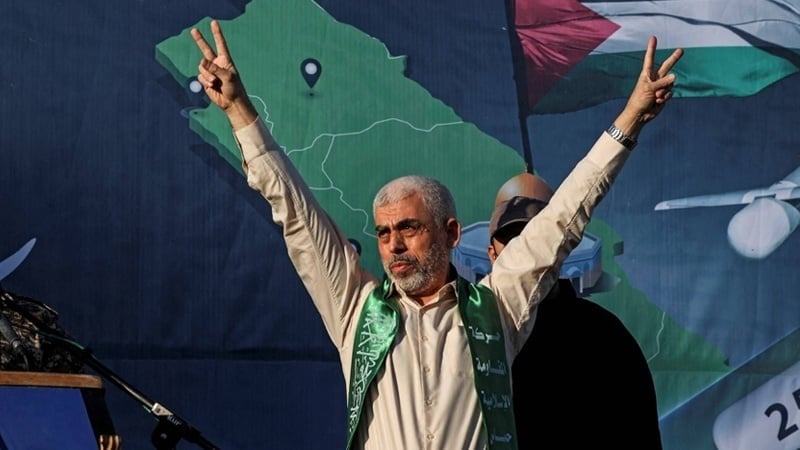One year after Sinwar's martyrdom: Fulfilling promises, continuity of resistance
-

Martyr Yahya Sinwar, the late head of the Political Bureau of the Islamic Resistance Movement (Hamas)
Pars Today – One year after his martyrdom, Yahya Sinwar has not reached an end, but has become the start of a new path. By architecting the Al-Aqsa Storm operation, he engineered the irreversible defeat of the Zionist regime.
According to a Pars Today report citing Mehr News Agency, on the first anniversary of the martyrdom of Yahya Sinwar, the late political bureau chief of the Islamic Resistance Movement (Hamas) and the architect of the historic "Al-Aqsa Storm" operation, revisiting his pivotal role in redefining the region's geopolitical equations is an undeniable necessity.
Al-Aqsa Storm: The architecture of military and intelligence defeat
The Al-Aqsa Storm Operation on October 7, 2023, Sinwar's masterpiece, was not a momentary reaction but the result of years of meticulous planning. Sinwar had previously warned: "Hamas will put the entire world against Israel." This operation, using basic tools like grenades, simple drones, and ground infiltration, mocked the Iron Dome, which was considered a symbol of Israel's superior technology. In this context, Aviv Kochavi, the former chief of staff of the Zionist regime's army, admitted that Hamas surprised the Israeli army with a "deceptive calm on the southern front." Ben Caspit, a prominent Zionist journalist, also called this operation "the most severe, painful, and humiliating defeat in Israel's history."
On the military front, Al-Aqsa Storm shattered the myth of the "undefeatable army." After two years of war, Israel is facing over 1,152 military fatalities and 80,000 wounded (including 26,000 with severe psychological disorders). The prolonged war, without achieving its stated goals (destroying Hamas and returning prisoners), led to a collapse of trust in the political and military institutions of the Zionist regime. Netanyahu, relying on right-wing appointments, intensified divisions; so much so that Isaac Herzog spoke of the danger of "civil war." This defeat is irreversible because it is structural: expensive, multi-billion-dollar technologies have lost their effectiveness against asymmetric and guerrilla tactics. Sinwar showed that simple weapons can also shake the foundations of an enemy's power.
Diplomatic and economic dimensions: The collapse of the global narrative
Martyr Sinwar, with a deep understanding of the importance of the battle of narratives, turned Al-Aqsa Storm into a platform to expose the true face of the Zionist regime. His prediction about Israel's war being seen as illegitimate came true: from genocide charges at the International Criminal Court to requests for the trial of the regime's leaders in global forums. In this context, Haaretz has admitted: "Before the war, the Palestinian cause had fallen off the global agenda; now, the Palestinians are at the forefront of attention."
Sinwar's diplomatic achievements are tangible: In May 2024, the UN General Assembly, with 143 votes, recommended full membership for Palestine. Recognition of Palestine by countries increased from 138 to 159, including countries such as Norway, Ireland, Spain, Slovenia, the United Kingdom, France, Canada, Australia, and Portugal.
This wave is the result of public movements worldwide: 45,000 demonstrations in 800 European cities, 90,000 protesters in Sydney, and widespread protests across Asia and Latin America. In the United States, a Pew Research Center poll in March 2025 showed that 60% of people hold a negative view of Israel, especially the younger generation growing up with a hatred of Zionism.
In the cultural sphere, 1,300 filmmakers worldwide, including from Hollywood, signed a statement boycotting Israeli institutions; a response to the regime's efforts to hire influencers with a $7,000 budget to change the narrative.
The economy of the Zionist regime also entered a severe recession following these developments; the regime's military spending in 2024 reached $47 billion, a 65% increase compared to previous periods. The regime's public debt surpassed 70% of GDP by 2025, and forecasts indicate a budget deficit of up to 16% by 2030. The withdrawal of over 1,700 investors from domestic markets and a decrease in economic activity are a direct result of the pressures from the Al-Aqsa Storm operation. Ben-Dror Yemini, a Zionist journalist, writes about this: "Gaza won through universities, media, and unions; Hamas managed to push Israel into economic and diplomatic collapse."
Sinwar's legacy: A symbol of unity and the steadfastness of resistance
The legacy of Yahya Sinwar transcends an individual personality and is manifested in the discourse of global resistance. He turned the Palestinian resistance into a comprehensive, global discourse for Islam. His comparison of Gaza to the Karbala of Ashura is a sign of the spiritual and strategic depth of his message. Sinwar's heroic martyrdom—fighting for hours against dozens of Zionists, resisting even with severe injuries—invalidated the common lies about "hiding in tunnels" or "using human shields." The official Hamas statement on the anniversary of his martyrdom emphasizes this point: "The flames of Al-Aqsa Storm will never be extinguished; the blood of the leaders paves the way for generations." Sinwar, like Qasem Soleimani and Seyed Hassan Nasrallah, became a "global figure"; a champion who embodied freedom and earned the title of architect of the Zionist regime's moral defeat.
Fulfilled promises: From freeing prisoners to a global revolution
One year after his martyrdom, Sinwar's promises have become reality. "The prisoners will be freed"; this statement was realized in the historic "Freeing Storm" prisoner exchange, during which 1,968 Palestinian prisoners, including those with life sentences, were released in exchange for 20 living Zionist prisoners and the bodies of captured Zionists. This exchange was described by Israel's Channel 7 as "loyalty to Sinwar's promise." Hamas announced: "The enemy failed and submitted to a ceasefire." Sinwar's other promise of "putting the world against Israel" also materialized; from widespread student protests in America and global support to shifting viewpoints. In Britain, negative views toward the Zionist regime have increased by 61% since 2013. By exposing the Zionist regime's "mask of victimhood," Sinwar turned it into a symbol of global genocide; similar to the situation Vietnam had for America or Algeria for France.
The irreversible defeat of the Zionist regime
One year after his martyrdom, Yahya Sinwar has not reached an end, but has become the start of a new path. By architecting the Al-Aqsa Storm operation, he engineered the irreversible defeat of the Zionist regime; a military defeat with the collapse of its army, a diplomatic defeat with global isolation, and an economic defeat with structural recession. Sinwar's legacy—in the unity of the resistance, the inspiration of generations, and the fulfillment of great promises like freeing prisoners and reviving Palestine—guarantees the survival of the cause; just as the Hamas statement says: "The flag will never fall." From within prison and the ruins of the siege, Sinwar taught the world that willpower can defeat technology.


